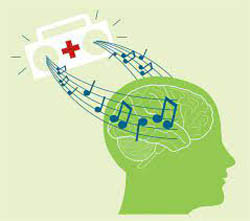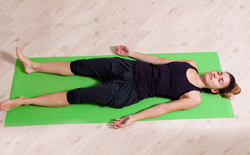Coronavirus
Project Susthiti — healing our Covid caregivers with Music Therapy and Yoga Therapy
Abstract
The Covid pandemic has opened up new challenges for healthcare systems, for care receivers and caregivers. Often, we tend to forget the wellness and well-being of the caregivers, better known as the Covid Warriors since our focus is on the care receiver. Caregivers need healing to raise their well-being and wellness so that they can raise their caregiving capacity. As a response, Project Susthiti designed and offered a programme blending Yoga Therapy and Music Therapy to help the Covid Warriors battle stress and burn-out. Our uniqueness lies in composing original Raga-based music tapping into the framework of rasas and rāgas based on the requirements of the Covid Warriors working in Covid wards and applying our music to induce deep relaxation, rest and sleep. 280 Covid Warriors received our 3-hour online programme. Our first pilot-study was conducted at Sri Pramukshwami Medical College, Anand, Gujarat and it was presented as an oral paper at the 5th Medicine Annual Conference Virtual 2020, Department of Medicine, Christian Medical College, Vellore in November 2020. Sixty-eight percent of the participants recorded significant change in alertness followed by calmness and control over anger.
Grasping the challenges
In late May 2020, during the peak of the first Covid wave in India, a resident doctor from a well-known public hospital called and informed that a couple of young doctors serving the Covid ward had attempted to commit suicide. Luckily, they were saved. This got us thinking that Covid healthcare workers are human beings and therefore they too need healing and care, so that they can become better caregivers. Our argument was, if the caregivers are not in a state of well-being, how can they offer treatment and healing to the care receivers? Aren’t we all emitters of the vibration that we carry within ourselves? This was the genesis of Project Susthiti. The Susthiti signifies harmonious stability in Sanskrit.
Every project begins with deep questions to our self. Given the enormous deluge on mainstream and social media on the Covid pandemic, we had to find threads of knowledge and practice, while trying to know the unknown. To begin with, we dived into what the medical fraternity said and wrote.
The Indian government addressed the whole gamut of Covid healthcare workers with honour as ‘Covid Warriors’ and had a repository which helped us to grasp the various nodes on how the Covid healthcare chain functions (1). For over two weeks, we spent time reaching out to 30 Covid healthcare workers, i.e. doctors, nurses and paramedics serving at isolated Covid-19 wards at five hospitals across India, to grasp the challenging task of providing therapy.
Here are the strands we managed to grasp.
Four prominent challenges emerged from our conversations with the Covid Warriors:
• Stress with symptoms of insomnia and indigestion, since their circadian rhythms were being disrupted, especially with continuous long night-shifts across weeks with little days to rest and quarantine themselves.
• Other stress-related symptoms included chronic back and knee pain and extreme dehydration due to wearing the un-comfortable Personal Protective Equipment (PPE) kit during their multi-hour shifts.
• Burn-out due to chronic fatigue which affects physical, psychological, emotional, spiritual health.
• Anxiety about carrying the Covid-19 virus when the Covid healthcare worker returns to his/her family home with a child or ageing relative.
According to the World Health Organization, “Mental health is a state of well-being in which the individual realises his or her own abilities, can cope with the normal stresses of life, can work productively and is able to make a contribution to his or her community (2)”.
While searching for scientific literature, we found, ‘Receptive Music Therapy to reduce stress and improve well-being in Italian clinical staff involved in COVID-19 pandemic: A preliminary study’. It was a study published by Elsevier in April 2020 and it provided us with some hope when it said that, “Clinical Staff (CS) can suffer from loneliness, anxiety, fear, fatigue, sleep disorders, which are likely to result in a poorer quality of healthcare for patients. […] What is more, long-term psychological consequences are also likely to be brought about, including higher levels of burnout, psychological distress and post-traumatic stress disorder”. This paper gave us hope that we were on the right path of therapy.
Where we begin
Our bodies are polyrhythmic, we have heart rhythms, brainwaves, breathing rhythms, hormonal and circadian rhythms. We walk, talk and function in rhythm. Our bodies and minds respond to rhythm and music.
“In reality illness is only a disequilibrium; if then you are able to establish another equilibrium, this disequilibrium disappears”, says the Mother (3). Illness then can be considered as a disequilibrium of rhythms, so can we proactively find, know and re-establish our rhythm so that equilibrium re-emerges and we cure ourselves.
B.K.S. Iyengar, the Hatha Yoga teacher, tells us that, “Yoga is like music: the rhythm of the body, the melody of the mind, and the harmony of the soul create the symphony of life’…”Yoga is a mirror to look at ourselves from within... (4)”, perhaps urging us to raise ourselves and become conscious of our inner rhythms and movements so that we can emit and offer our best to others. The Mother says, “The role of music lies in helping the consciousness uplift itself towards the spiritual heights (5). She gently pushes us to revisit to the true purpose behind the Yoga of Music. Sri Aurobindo writes, “They [the forces of illness] first weaken or break through the nervous envelope, the aura. If that is strong and whole, a thousand million germs will not be able to do anything to you. The envelope pierced, they attack the subconscient mind in the body, sometimes also the vital mind or mind proper — prepare the illness by fear or thought of illness (6).” These were our guidelines for creating the online methodology and therapy programme.
Inspired by Integral Yoga, Know Your Rhythm is a training programme and methodology that helps participants discover their own sense of rhythm in life and work, raising well-being, wellness, empathy, teamwork and leadership. Essentially, it is a toolkit for exploring and raising consciousness with immersive exercises with the Yoga of music - mantra - body - breath - sleep as its medium. Over the past decade, Know Your Rhythm has engaged about 20,000 caregivers including those working in healthcare, wellness and education spaces.
Our methodology bridges the following two therapeutic sciences with Integral Yoga as overarching truth.
Yoga Therapy is the process of empowering individuals to progress towards improved health and well-being through the application of the teachings and practices of Yoga. Source: International Association of Yoga Therapists (IAYT, http://iayt.org) |
Music Therapy is an allied health profession and one of the expressive therapies, consisting of a process in which a music therapist uses music and all of its facets— physical, emotional, mental, social, aesthetic, and spiritual — to help patients improve their physical and mental health. Source: International Association for Music & Medicine (IAMM, https://iammonline.com) |
We built an online healing programme centred on paradigms and our 3-hour therapy programme dipped into various yogic exercises including restorative Āsanas, Mudras, Mantras and Prāṇāyāma, leading to Yoga Nidra with our original rāga-based music composition. Rāgas can be considered as music healing modalities that evoke certain rasas (emotional archetypes). Each of our 1-hour module concentrated on a particular value — empathy, equanimity, bravery — as an antidote to fear. Here is a sample of our original rāga-based composition which was applied with Yoga Nidra in Śavāsana: https://www.ninad.in/Orchestral_Maru_Bihag_excerpt_applied_as_therapy.mp3
Architecture of the online Know Your Rhythm therapy programme
Our challenge here was to come up with an online training programme that generated therapeutic value, easy enough to engage our target-group’s tired bodies, minds and hearts, make them smile and one that had content they could do on their own after the programme. Our constraints for teaching were many: teaching āsanas over the Internet requires us as teachers to be patient since we cannot monitor each learner with the same amount of detailed attention as in a physical class; the Internet presents latency when it comes to mantra, especially with rhythm, so much so that simultaneous chanting of even AUM (Pranav Mantra) together leads to complete cacophony. Some of our target audience members feel so much fatigue that all they want is for us to help them sleep like a log during Yoga Nidra right away. And finally with mental stress comes the inability to follow instruction at s and an attention-span that can be limited. Additionally, the sessions typically took place the target-group’s home before their night’s sleep and post-dinner, so we had to be cautious that our session did not interfere with their digestion process nor that of family members. In all, the asana sequence had to be created in the modality of Restorative Yoga.
Keeping all these constraints in mind, we optimised our architecture of Know Your Rhythm to a bare minimum across 3 hours with 1-hour modules across three evenings, for one week with focused themes on building:
1. Empathy
2. Equanimity
3. Bravery
Each of the sessions had a sankalpa or affirmation.
Module 1: Empathy Sankalpa: ‘I build Empathy and Compassion towards myself and others by listening to myself and others.’
Duration (minutes) |
Activity |
5 |
Learning AUM chanting and learning how to listen deeply and love your own voice, sitting in Sukhāsana or simply on sofa or bed |
10 |
Āsanas with a sequence of Supta Tadāsana (Reclined Mountain Pose), Bālāsana (child pose), leading to Śavāsana (corpse pose) |
30 |
Yoga Nidra with Sankalpa with our Rāga Maru Bihag composition described earlier, with Śavāsana (corpse pose) |
10 |
Circle of sharing of experiences |
Module 2: Equanimity
Sankalpa: ‘I build Equanimity and stay resilient in all circumstances.’
Duration (minutes) |
Activity |
5 |
Continue with AUM chanting while holding Mukul Mudra seated in Sukhāsana for healing a muscle or organ which needs healing |
10 |
Āsana sequence of Supta Tadāsana (Reclined Mountain Pose), Vajrāsana (diamond pose) leading to |
30 |
Yoga Nidra with Sankalpa with our Rāga Maru Bihag composition with Śavāsana (corpse pose) |
10 |
Circle of sharing of experiences |
Module 3: Bravery
Sankalpa: ‘I am brave and feel proud to serve my Motherland.’
Duration (minutes) |
Activity |
5 |
Learn to chant a mantra with AUM Namo Bhagavate which translates into ‘I bow to the Almighty’ while sitting in Sukhāsana with Gyan Mudra |
10 |
Meditate with Vajrāsana or seated at the edge of the chair seat with spine upright (diamond pose) leading to Śavasāna (corpse pose) |
30 |
Yoga Nidra with Sankalpa with our Raaga Maru Bihag composition with Śavāsana (corpse pose) |
10 |
Circle of sharing of experiences |
Pilot study
Our first pilot study with 19 Covid healthcare workers was conducted across a week at Shree Krishna Hospital, Pramukshwami Medical College, Gujarat, India in August 2020. The emotional well-being of participants was recorded in an investigator-designed questionnaire, wherein subjective experiences of seven parameters, viz., happiness, calmness, alertness, stability, clarity of thoughts, control over anger and self-observation were recorded on a Likert scale. On the third consecutive day of the Know Your Rhythm session, 68% of the participants recorded significant changes in alertness followed by calmness and control over anger.
All participants registered improvement in one or more parameters of emotional well-being on several days of the week. Fifty-two percent of the participants recorded consistent beneficial effects throughout the study period. Our pilot study as oral paper titled, ‘The Effect of Music on Healthcare Professionals Working in Covid-19 Isolation Wards — A Pilot Study’ (Yajnik et al., 2020) was presented at the 5th Medicine Annual Conference Virtual 2020, Department of Medicine, Christian Medical College, Vellore, India, November 2020.
Subsequently, 280 Covid Warriors have received our 3-hour online programme.
In June 2021, Project Susthiti received the Seva Award 2021 from the International Association of Yoga Therapists (IAYT) at SYTAR 2021 (Symposium on Yoga Therapy & Research). At SYTAR, we also released a therapeutic composition dedicated to all the Covid health-care workers of the world.
Deeper questions ahead
We were and still are experiencing and living in an era of crisis, at all levels, as individuals and members of the collective. The urgency to evolve ourselves has never been stronger as the social fabric of our society has been challenged during the ongoing pandemic. What is the purpose of this pandemic? Given the complex healthcare challenge and its repercussions across all spheres of life, can we re-define what health and healthy living means to us? How can we broaden the scope of health and healthcare? How can we heal ourselves? Is this period a crisis or a divine-induced opportunity to re-purpose our life and evolve ourselves? Perhaps the solutions to these complex questions lie within ourselves? Integral Yoga offers us an inspiring fountainhead of philosophy and practice for us to take an active part in our own evolution. It is up to us to create conditions for the Divine Grace to descend upon us.
Our collective experience with Project Susthiti tells us that we need to re-think how our mainstream healthcare could evolve as a space for healing. Caregivers are human beings just like the rest of us and they also need healing to raise their well-being and wellness so that they can raise their caregiving and healing capacities. Healing is likely to happen when we can reject fear with a smile, calm the mind and vital, and help the body consciousness to grow at a new level of equilibrium, a new rhythm.
References
1. Covid Warriors [Online] Available from: https://covidwarriors.gov.in/default.aspx [Accessed 19th January 2022].
2. World Health Organization. Strengthening mental health promotion. Geneva: World Health Organization; 2001, p. 1.
3. The Mother. The Collected Works of the Mother, Volume 5. 2nd ed. Pondicherry: Sri Aurobindo Ashram Trust; 1998, p. 121.
4. Iyengar BKS. Light on Life: The Yoga Journey to Wholeness, Inner Peace, and Ultimate Freedom. Bangalore: Iyengar Yoga Books; 2006, pp. 59-60.
5. The Mother. Collected Works Volume 12. 2nd ed; 2002, p. 240.
6. Sri Aurobindo. The Complete Works of Sri Aurobindo, Volume 31. Pondicherry: Sri Aurobindo Ashram Trust; 2014, p. 569.
Arnab Bishnu Chowdhury, a composer, music and yoga therapist, is Founder of ‘Know Your Rhythm’ and a researcher at the Sri Aurobindo Ashram in Pondicherry; Dr. Bhalendu Vaishnav is Professor and Head of the Dept. of Medicine, Shree Krishna Hospital, Pramukhswami Medical College, Karamsad, Gujarat; Sevastiana Korotynskaia is a Classical violinist from St. Petersburg, Russia and part of the Faculty of ‘Know Your Rhythm’; Karen Miscall-Bannon is a yoga therapist based in California, USA.
Share with us (Comments,contributions,opinions)
When reproducing this feature, please credit NAMAH,and give the byline. Please send us cuttings.








